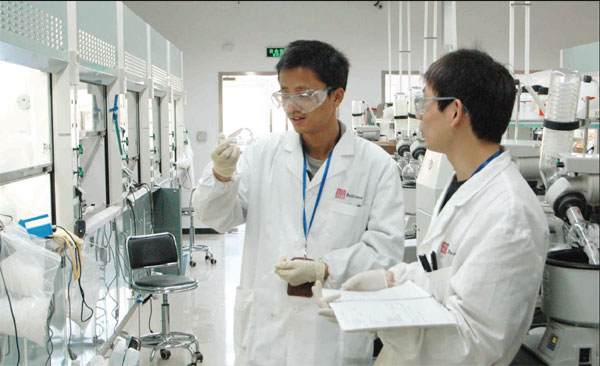BeiGene's cancer therapy gets green light
By Liu Zhihua | chinadaily.com.cn | Updated: 2020-04-12 18:32

China's biotechnology company BeiGene Ltd announced on Saturday that its anti-PD-1 antibody tislelizumab, an immunotherapy, had received approval from the China National Medical Products Administration as a treatment for patients with locally advanced or metastatic urothelial carcinoma (UC), the most common type of bladder cancer, following the therapy's initial approval in classical Hodgkin's lymphoma by the NMPA in December.
The NMPA approval is based on the clinical results from a single-arm, multi-center pivotal Phase 2 trial of tislelizumab in patients in China and South Korea.
Among patients who were evaluable for response, with a minimum follow-up of 12 months and a median follow-up of 14 months, the objective response rate (ORR) as assessed by the independent review committee was 24.8 percent, and the complete response (CR) rate was 9.9 percent.
The newly approved indication, for patients suffering from locally advanced or metastatic urothelial carcinoma with PD-L1 high expression whose disease progressed during or following platinum-containing chemotherapy or within 12 months of neoadjuvant or adjuvant treatment with platinum-containing chemotherapy, is the first in a solid tumor indication.
According to Ye Dingwei, vice-president of Fudan University Shanghai Cancer Center, patients with advanced UC have limited treatment options, and it is great that tislelizumab, a new immuno-oncology treatment, becomes available to them.
Supported by encouraging efficacy and safety results from the trial, tislelizumab is believed to bring significant benefits to the patients, he said.
The company also has a broad development program for tislelizumab that encompasses 15 potentially registration-enabling trials globally and in China, in indications including lung, liver, esophageal, gastric, nasopharyngeal, and MSI-H or dMMR cancers, in addition to classical Hodgkin's lymphoma and UC.
"This is our third new drug application approval in the past five months for our internally developed products, a tremendous accomplishment for a young biotechnology company like BeiGene and validation of the team's hard work," said John V. Oyler, the company's chairman, co-founder, and CEO.
"Our strategy for tislelizumab has always been to pursue a broad label and serve patients who are battling different types of cancer. With tislelizumab's first solid tumor approval, we are even more excited about the outlook for this immunotherapy than ever."
However, like other immune checkpoint inhibitors, tislelizumab could cause immune-related adverse reactions that mainly include pneumonitis, diarrhea and colitis, hepatitis, and endocrinopathies (hypothyroidism, hyperthyroidism and thyroiditis, adrenocortical insufficiency, hyperglycemia and type 1 diabetes mellitus), and skin adverse reactions. Occasionally, nephritis, pancreatitis, myocarditis, myositis, and other immune-related adverse reactions were also reported, the company said in a release.
Most common adverse reactions included rash, fatigue, and increased alanine aminotransferase.
The recommended dose of tislelizumab is 200 mg administered as an intravenous infusion every three weeks until disease progression or intolerable toxicity.
Tislelizumab is not approved for use outside China.
























